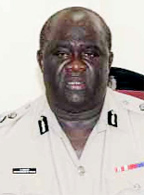It was at the annual officers’ conference only in March this year that Commissioner of Police Henry Greene lamented the severe personnel shortage of about 20 per cent of the establishment strength of the Guyana Police Force. Yet, six months later, the Police Service Commission found it necessary to dismiss one of the Force’s most promising senior officers. Instead of rebuilding a full-strength, professional organisation and removing the disincentives to officers’ service, the administration seems bent on promoting its favourites and punishing those it disfavours. What is going wrong?
The administration seems obsessed by the belief that the most important thing in police administration is to appoint compliant commissioners and to place its pets in influential positions, regardless of their performance. This retarded thinking was behind the demoralising practice of retaining commissioners after they had passed the age of retirement. As a result, commissioners Laurie Lewis, Floyd McDonald and the incumbent Henry Greene himself were all allowed to serve beyond the mandatory retirement age of 55 years. In the case of Greene, the administration has not even appointed a substantive deputy commissioner to understudy him.

The evidence suggests, nevertheless, that officers accused of misdemeanours – including involvement in immigration rackets and extra-judicial killings – have not only been protected from prosecution but have also been promoted to higher ranks. In doing so, talented younger officers were prevented from reaching the top position and, in turn, this contributed to the demoralisation of the Force’s senior commanders.
The most recent example of discrimination and demoralisation is the dismissal of Superintendent Simon McBean earlier this month. McBean’s misdemeanour was to win the award of the prestigious Chevening Scholarship offered by the British Government in September 2007 to pursue a Master of Science programme in Global Security and Policing at the University of Leicester.
Funded by the British Foreign and Commonwealth Office and administered by the British Council, the Chevening Scholarship is a world-wide scheme that enables talented, foreign graduates and young professionals to gain skills that will benefit their home countries by studying at universities in the United Kingdom. Application for the scholarship is open and selection is based on objective criteria prescribed by the British Government.
Mc Bean’s success was the start of his problems and would be the end of his career. The British High Commission made a public announcement of the award of the scholarship. This alarmed certain elements in the administration who realised that such moves might impede the placement of their own clients who were not so well qualified. They also seemed to hold the view that the British were selecting persons from within the Force whom they favoured, without consulting the Government. These apprehensions were reportedly conveyed to the British High Commission by the Government of Guyana and the British explained the selection process.

The matter was eventually taken to the Cabinet which directed that a policy paper on study leave in the Police Force should be prepared for its consideration. This was done. It was pointed out, however, that an informal policy was already in place and several officers and subordinate officers – including Assistant Commissioner Henry Greene (Law); Senior Superintendent Keith John (Law); Assistant Superintendent Gordon Gilhuys (Law); Sergeant Patrice Henry (Law); and Corporal Cecil Sullivan (Law) – had already benefitted from ‘scholarships’ while they were still in service. It was widely known, therefore, that precedent for McBean’s scholarship existed.
In this instance, because of the nature of his studies, McBean would have been enabled to develop an understanding of crime focusing on the problems of explaining, measuring and preventing crime. He was expected, on returning to the Force after the course, to play an active role in the implementation of the Security Sector Reform Action Plan.
The four-year, bilateral Interim Memorandum of Understanding for a Security Sector Reform Action Plan had been signed by British High Commissioner to Guyana Fraser Wheeler and Head of the Presidential Secretariat Dr. Roger Luncheon on 10th August 2007. McBean has joined a growing list of Guyanese − including Minister of Finance Dr. Ashni Singh, Attorney-at-Law Gino Persaud and, most recently, university lecturer Donna Ramdial − who would have distinguished themselves from the Chevening programme.
There is no question about the quality of McBean’s service, his suitability for the scholarship or the necessity for the type of knowledge that he acquired. He joined the Police Force as a constable in 1993. In addition to completing basic police training at the Felix Austin Police College, he was appointed as a cadet officer and selected to attend the Standard Officers’ Course at the Guyana Defence Force’s Colonel Ulric Pilgrim Officer Cadet School. He was subsequently ‘gazetted’ as an assistant superintendent.
Ambitious and industrious, Mc Bean served as an assistant superintendent as the Officer in Charge of Immigration at the International Airport, Timehri and as Deputy Sub-Divisional Officer in ‘A’ Division in Georgetown. As deputy superintendent, he served as Sub-Divisional Officer in ‘B’ Division in Berbice. He was appointed Second-in-Command of the Tactical Service Unit in Georgetown and selected to command the Guyana Police detachment to provide support to security forces in Barbados during the Cricket World Cup competition in 2007.
When the grant of the scholarship was approved, McBean formally applied for special leave but this was denied by the administration. Owing to pressure of time and the commencement of studies, he then sought ‘no-pay-leave’ and this too was denied. He then applied for three months’ accumulated annual vacation leave to which he was entitled. Everything went well until the three-month vacation expired. In the midst of his studies, McBean was obliged to apply for ‘sick leave’ through the Guyana High Commission in London.
On the successful completion of the scholarship, McBean returned to Guyana in 2008 and continued to serve the Police Force with full pay. Without warning, he was superceded for promotion in December 2008. This was the time when a senior officer who had been deported from North America and had been implicated in a narcotics scam and another who was currently facing disciplinary charges before the Police Service Commission were promoted.
In a clear example of political intervention in a professional matter, the politically-appointed Police Service Commission sprang into action even before the Guyana Police Force enquired into Mc Bean’s alleged misconduct or had brought charges against him. The Commission summoned a special session to defenestrate Mr Mc Bean who was sent a letter directing his dismissal from the Force with effect from 25th December 2007.
The Commission gave as the grounds for its action his unauthorised participation in a Master’s Degree course in Global Security and Policing at the University of Leicester in the United Kingdom, stating that in so doing, he “breached several regulations/standard procedures.” Up to the time of his dismissal, Mc Bean had not been called upon either to be told what charges were laid against him or to explain the reasons for his behaviour.
The administration acts ever so quickly and decisively when it comes to picayune matters and the pursuit of personal vendettas. Pushing the reform programmes that have been designed for the Police Force is quite another matter. Outstanding reports – such as the Strategic Report by the Symonds Group, funded by the Department for International Development and the Report of the Disciplined Forces Commission – still languish unimplemented after several years; the four-year, Security Sector Reform Action Plan has been halted largely through the intransigence of administration officials and the implementation of the IDB-funded Citizens’ Security Programme is behind schedule.
It this an organisation that is keen to attract ambitious, educated young men and women to embark on careers of law enforcement and public safety?




